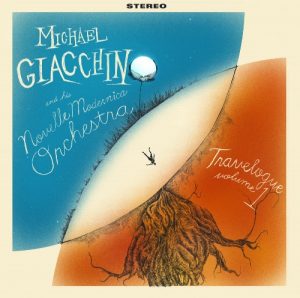
If you were to reflect upon the roster of amazing composers from the past twenty years, it wouldn’t take long to arrive at Composer Michael Giacchino, whose Academy, Emmy and Golden Globe-winning music has provided him quite a fanbase outside the amazing movie franchises in which he’s played a key role.
2004 probably could be seen as Giacchino’s breakout year, as he scored the JJ Abrams’ produced ABC series Lost (for which he won an Emmy) and began his long run of Pixar Animation films with The Incredibles. Those relationships continued onto Giacchino’s scores for Abrams’ Mission: Impossible III and Star Trek, as well as Pixar’s Ratatouille and Up, the latter for which he won his Oscar and Golden Globe. From there, Giacchino followed Incredibles director Brad Bird onto his other movies, including Mission: Impossible – Ghost Protocol and Tomorrowland, and also continued working on epic genre franchises like Jurassic World, Spider-Man: Homecoming, Matt Reeves’ Dawn and War for the Planet of the Apes, and last year’s Spider-Man: Far from Home.
That brings us to 2020, and the COVID-19 pandemic that has hobbled most of the film and television industries, also putting Giacchino’s planned work on Jurassic World: Dominion and The Batman on temporary hold. Under those circumstances, what is a musician to do except what Giacchino did by writing and recording his very first music album under the name, Michael Giacchino & His Nouvelle Modernica Orchestra – Travelogue Volume 1.
For fans of Giacchino’s score work, it’s an amazing collection of musical styles that also tells an intriguing science fiction story, because yes, Travelogue Volume 1 is indeed a concept record. It’s a great example of necessity being the mother of invention as Giacchino managed to get all his usual musicians on the record without any of them ever having to step inside his expansive home studio.
If that wasn’t enough to keep the composer busy in 2020, he also released his directorial debut, a short film called Monster Challenge, a comedic ode to Japanese culture, starring Patton Oswalt, Ben Schwartz and others.
Below the Line got onto a Zoom call with Giaccchino from his amazing office and studio where childhood toys and career-spanning memorabilia lined the shelves in the background.
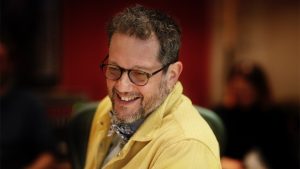
Below the Line: Is this your first album of music other than movie and TV scores?
Michael Giacchino: Yeah, I have a ton of stuff like that, but this is the first one I’ve done just for me, which I’ve always wanted to do. Forever. I’ve had this idea to do this for such a long time, but I just never had the time to do it, because the movies were literally just back to back to back for years. When all of this happened, and COVID hit, I found myself home, and I found that all the movies I was about to work on got pushed into oblivion. I thought, “Oh, well, I can do this. I have this time now, I can do it.” So I literally just sat down and just went at it.
BTL: So this project literally started in March of this year and hadn’t been brewing for a while?
Giacchino: On March 13th or something like that, when we finally were like, “Alright, I guess we’re home for…?” At that time, we thought for a couple weeks. I remember thinking, “Well, what can I do? The movies are getting pushed. I might as well spend time writing the themes and different ideas for the movies I know I’m going to be working on, get a head start on that stuff.” About a week or so into doing that, I thought to myself, “What am I doing? I should just be doing things I want to do. I have this time that’s been given to me.” I put all that aside, and I just went right to work on the things that I wanted to do, because it’s something that I rarely ever get the time to do. I just sat down and wrote it. It was an idea I had for a long time, but I had never written anything for it, so it was just about putting it out. It was great. I felt like it all happened so fast so I was able to just treat it the way I treat work, which is sit down and schedule it out and get it done. But it was really fun, because it was just me. I didn’t have to show it to anyone or get an approval from anyone or have that sort of a working relationship with anybody. It was just me. So I had a great time.
BTL: I have spoken to quite a few musicians who become such in-demand composers, they no longer have time to do their own music anymore.
Giacchino: It’s true. Once you get into that world and look, I love everything I have worked on. I am so happy for all the things that I have done so far. If you were to go back to my 10-year-old self and say, “Okay, you’re going to be able to work on movies when you’re older, which is what I wanted to do, what kind of movies would you want to work on?” I probably would have told you, “I want to do a Planet of the Apes movie. I want to do a Star Wars movie. I want to do Star Trek, I want to do Marvel things or DC,” and I’m doing them. So I feel super lucky to be able to play in all of those playgrounds. At the same time, I also missed those times when I would just go down into my basement and make a movie, and it wasn’t based on anything other than what was in my head. I went to film school, and I did that from nine years old all the way through film school. Music wasn’t the focus and wasn’t the thing I thought I’d be doing. It’s where I ended up and I love it, but I also missed that being able to make something for myself and share it with people.
BTL: As I was listening to this, I wondered if there were any musical cues you might have written for other movies or filmmakers that were nixed, so you decided to use it on your own album.
Giacchino: No, anything like that when that happens, I just toss it I don’t save any of that stuff. I probably should. It might be good idea to have, but no, it was just all written brand new for this thing, and it’s usually how I approach every project is just like, “Alright, what am I going to create only for this project?” and whatever falls through the cracks, I let it fall through the cracks and let it go. I don’t hold on to things like that. I hear of guys that have like drawers of stuff, and then they can just pull out something and use that, and I go, “That would actually be convenient.” I guess I’m not that organized when it comes to that.
BTL: I’m not sure if you get this reference, but your record reminded me a bit of Rick Wakeman’s Journey to the Center of the Earth.
Giacchino: Yeah, I absolutely get that reference, and it’s pretty much dead-on what I wanted to do, make a concept album that had a story, that had a whole theme through the whole thing. I used to love when they would do that, and ELO with Eldorado, things like that, where you really get a sense that there was a bigger idea beyond just the individual pieces themselves. I mean, Led Zeppelin did it. It was a thing, and they were all storytellers, in a sense. To be able to tackle a whole album in that way was great to see growing up. Now those things don’t really exist. They don’t really do that anymore. Everyone just cherry picks whatever singles they want to buy off of their streaming and music services. The idea of listening to something from beginning to end, it doesn’t really exist. It’s kind of faded in our collective psyche in the culture right now. I really wanted to kind of give something to people that if they took the time and had the patience to sit down for an hour and do nothing but listen. It would be like giving them a story that they could just kind of imagine in their head and escape from this craziness that we’re all sort of involved in right now.
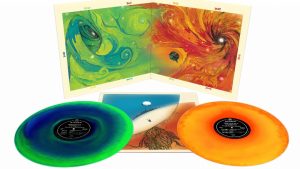
BTL: Who was the narrator on the record?
Giacchino: Janina Gavankar, she is incredible. She and I have been friends for years, and she’s done a lot of things. She’s been in a lot of movies and TV shows and also the voice of one of the main characters of Star Wars video game, which is cool. I literally just called her up and just said, “Hey, I have this crazy idea. What do you think? Do you want to…?” and before I even got the words out of my mouth, she’s like, “Yes, yes. Just what is it? Let’s do it. Let’s do it.” I think everyone is kind of looking for something creative and some sort of outlet to do something that isn’t the norm of what they’re normally doing, especially at this time. She was wonderful, and and Alison Eve Hamersley wrote the text for the album. I pitched Allison the whole idea and what I wanted the scope to be and how I wanted a beginning, middle and end, and she did a wonderful job putting those those ideas together. It was one of those things where I wanted it to feel. This album is a mish-mash of everything I love. I love concept albums from the 70s, I love Martin Denny and Esquivel and Les Baxter, all of these guys that were doing this fantasy music in the late ‘50s and ‘60s. I loved that, and then I also loved X Minus One, which is an old 1950s sci-fi radio show, which is amazing, and the writers were great. It’s slightly melodramatic, as all of those radio shows were, and I thought if I could mix this all together into one thing, that would be my dream, you know? Janine is sort of doing the whole Captain Kirk blog thing in terms of recounting her experiences, and I used to love how his logs were nothing like real ship logs would be. They were more like these little soliloquies that just sort of ponder the experience he just had or is about to go into. I thought that would be an interesting way to approach this story is to tell it through those sort of thoughts, all coming from her.
The idea initially came from looking around the world today. It sort of evolved. I knew I wanted to do the album, but the heart of the album evolved during everything that’s going on now. If you look around the world, it’s pretty bad — It’s not great. I thought, “What if someone was coming from another planet that was filled with hatred and racism and pollution and political unrest?” And they said to themselves, “You know, what? Screw this. I’m just going to go find somewhere else to live, because this is pointless. This is useless. I can’t do anything about this.” And they go, they search far and wide, they find earth, and they say, “This looks pretty great. I’m going to spend some time here. I think this might be the place,” and then, of course, over time start realizing, “Oh, God. This place is actually worse than where I come from.”
And then the moral dilemma sets in of, “Well, did I do the right thing by leaving? Should I have stayed and just tried to make it better?” So that’s the question it asks. When things get tough, What do you do? Do you stay and try to work through it and make it better? Or do you run from that and try and find somewhere else to exist? I think for this character, the answer was to return home, and try to make it a better place. It’s sort of asking that question of all of us here. What do we do when things get tough, and when things get hard? How do we do that? By not just helping ourselves, but by also helping everyone around us. What do we do? So yeah, that’s the idea behind it.
BTL: I was curious about the titles of the different tracks. You didn’t try to come up with anything too fancy, but you also have a reputation for coming up with funny titles for your cues. This one you kept very simple.
Giacchino: I wanted the listener to really just focus on the story and what was going on. I felt that if I had too much descriptive goofiness going on in the in the text, it would work against that. I do think it’s one of those things where you should open yourself up to the experience, just sort of close your eyes and let it happen, and then open your eyes in an hour afterwards and see what you make of it. If you really look at all of those things… and once the vinyl comes out and the CD, you’ll see there’s a ton of storytelling just in the artwork, the album itself, which really digs deep into what the story of the album is. It’s a lot of clue-finding and hunting and looking for things and noticing things in the artwork that really kind of tie all the story points together. Those kinds of things, I think, are fun. I remember albums and used to just stare at that record cover while you were listening to the record. If it had text, you’d read everything on it; if not, you’d just stare at the images. I loved that, and it was just a little bit of nostalgia for that kind of a thing. I didn’t want to take the focus off of what the content of the album was by making funny names, but it is all tied into a very specific science fiction story, if you really dig deep into all the text that’s there.
BTL: I assume you have your own studio, so did you do the entire album there and was it all on your computer? In your studio?
Giacchino: This is my office here where I do my writing. There’s a piano over there, and then there’s my whole setup here with the writing for mockups and synthesizers and all that. I couldn’t bring all the players over here to do it, so what we did was I’d write out all the parts, we would send them the charts, and they would record it at home. Then they would send it in, and we put it all together here. I was a little worried at first that it wouldn’t sound natural, that it would feel like it was manufactured in some way. I didn’t really count on the fact that everyone in the band — these are guys that I’ve been working with since I started — we know each other so well, and we know each other’s sensibilities. They know what I like, what I expect, and I know what they can do, which is almost limitless what they can do. They’re so good. When it all started coming back together, my engineer, Warren Brown, did an amazing job putting it all into a space where it felt like we were all in the same room recording this stuff that day. It was a very different recording experience. I am used to putting everyone in the same room, getting it done and then moving on, and this was quite different. Harp would come in one day, and it would trickle in over time. We didn’t get all the pieces at once, so it was a bit of a longer process than you would normally have. I also think it opened up a creative avenue for the individual musicians to add more of themselves in as well, which was really great. It helped sort of propel the whole thing forward. So it was a different but really great experience. There is going to be a second one, a Volume Two, and we’re talking about, “Well, if things are better, we should just record it all together,” but I’m like, “No, maybe let’s just do the same thing again,” because that created some kind of vibe, which was really great, which I love, so we’ll see.”
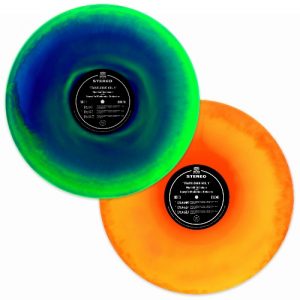
BTL: You’ve done a few concerts, and I saw pictures from your 50th birthday concert at the Royal Albert Hall, which looked amazing. Was that recorded or filmed?
Giacchino: We did it for archival purposes, and maybe one day, we could put it out. That would be nice. There’s all kinds of issues when dealing with Union stuff and all of these things that you want to make sure that get handled correctly. The concerts have been wonderful to do between that one, the Lost concerts, the Christmas thing we did at the Albert Hall. There’s all kinds of fun. I love connecting with the audience and sharing the music in that way is always just the greatest. It’s always pretty humbling and amazing to see how how this material can live on beyond the lifecycle of the film. Once the film has left the theaters and all of that, it’s amazing to see, especially something like Lost. That to me has been a really incredible thing to be a part of just because it’s in the psyche of this whole generation of people, and then they’re sharing it with their kids, and it keeps coming back. When we do a Lost concert, people come from all over the world. It is the craziest thing in the world. I always say, “Alright, who thinks they came the farthest?” Everybody raises their hand, and you get this jumble of answers like South Africa, Japan, Australia. It’s crazy how far they come for this, so it’s neat to see what it means to people. You really get a sense when you share it in that way what these projects mean to people.
BTL: So have there been any thoughts once we get through the pandemic, putting some sort of concert or tour together to play this record?
Giacchino: That is definitely the goal. We did the animated teaser for it, and my hope is to animate the entire thing and have that play behind the band live while everyone’s playing. That would be my hope, and do it on the music festival circuit, which I think would be perfectly suited for something like that. To do it either at Coachella, Outside Lands, Life is Beautiful, things like that. Bonnaroo, Glastonbury, those would be a lot of fun to share something big and new with everyone. Hopefully, we’ll get to a place where we can actually go to concerts again.
BTL: Would you find a cape to wear at the concerts?
Giacchino: A cape, a top hat, maybe even a monocle, who knows? [laughs]
BTL: I’m glad to see you’re doing the Tim’s Twitter Listening Party in a couple weeks. I’m not sure if you’ve had a chance to check them out, but they’ve been a great way to spend time during the pandemic. Your record seems like it would be perfect for it. It’s all about a group of people across the world listening to an album from beginning to end, and it’s been a lot of fun.
Giacchino: Yeah, I’m very excited about that. It’s gonna be a lot of fun. That’s such a great avenue. I didn’t know about that too much until they mentioned it to me and then doing the dives into it, and you go, “Oh, my God, this is great, just learning about all this new stuff is wonderful.” I always feel like for independent musicians, it’s a tough world, because people making music, that they can do, but getting it out to the world is so hard to share that stuff. I’m very luck, because of the things I’ve worked on have afforded me a presence that there’s an awareness, that I can get something out, and that’s great. When I think of the people, either just starting out or doing things completely on their own, it’s really hard.
BTL: You mentioned the delays in some of the movies you were scoring, and obviously, two of the bigger movies you were scoring, Jurassic World: Dominion and The Batman, had to stop production, but then they restarted and had a few issues. In fact, Jurassic World restarted production after being postponed a few weeks back.
Giacchino: It’s hard to keep track anymore, because it’s on, it’s off, it’s on, it’s off, and I know Batman as well has had its woes. Look, it’s hard to make a movie in the best of circumstances, but to do it like this, it’s like a madhouse, to quote Planet of the Apes. It’s a little nuts. I don’t know how they’re doing it. I really feel for the crew and the people involved. I talk to Matt [Reeves, The Batman director], and they’re long hours, and you’re all in masks and shields and completely covered. It’s tough, it’s tough.
BTL: You worked with Matt and Colin Trevorrow (Jurassic World director) before, so are you generally there from the beginning of their projects and writing any cues or themes in advance?
Giacchino: No, not often. I thought for this one maybe I would, because I had the time, but then I decided to re-shift where I spend my time. I’m usually around, because we’re all friends, so I know what’s going on. We talk to each other through the production. I’ll check in with them, see how they’re doing or in normal times, I can go to the set and just visit, but not so much for work other than to get a feeling for what’s happening. Usually, most of the work, 99% of it, happens in those final stages where there’s a version of the film that I could watch, I can look at, and I can start understanding sort of what what they’re going for and start with that. At this point, it’s more just fun for me, where I can just check and see how they’re doing.
BTL: I would think that with Jurassic World: Dominion, you could at least write some themes, since it’s your third movie and you already have some sense for those movies?
Giacchino: You could normally, but the truth is in normal times, I’d probably be in the middle of two or three other films right now. I wouldn’t have the time to do that, so they line up against each other, and you go, “Okay, this one’s done, what’s next? Bring on the next one.” This would have been one of those times where I could have done that, but then I really just felt the need to spend some time on my own things.
BTL: I want to ask you about this short you directed that came out earlier this year, Monster Challenge. I literally watched it for the first time, because I found it on your website. I was curious how that came about.
Giacchino: It sort of came about the way the album came about, which was like, “Here’s an idea I had been wanting to do.” I had been working so hard on scoring films that I was making out on making movies, and I just missed that process of doing it, having grown up doing it. I was just like, “You know what? Screw it. I’m just gonna make one.” I’m just gonna do it for me. There was there was no goal other than to make it, which was the way it was growing up. There was no goal, just make it and then show it to people. This was something that I thought of, and Patton [Oswalt] was the first person I called. We had worked together on Ratatouille, and I pitched him the idea, and he’s like, “Let’s make it, let’s do it,” and then of course, called Ben Schwartz and Dermot Mulroney and everyone down the line, Amy Brenneman. People I either was friends with already or had worked with before. It was a real sort of family environment, the whole thing. My kids were on the crew and everything. That was just something I was like, “I think this would be silly and fun. Let’s make it.” That sort of feeling is why I’m even doing what I’m doing, because my whole childhood was, “Oh, this seems fun. Let’s do this. Let’s make something together.” Again, in the way the album combined a lot of my loves, that short combined a lot of other parts of things that I love, including kaiju movies, Japanese entertainment and movies and culture and mixing that with our own weird culture, and just seeing what comes out of that. It was just sort of a love of everything that I grew up with that came out of Japan, including Ultraman, Godzilla. I was raised on it, and I love it, so I was just reaching back into that world. Let’s do something fun with that.
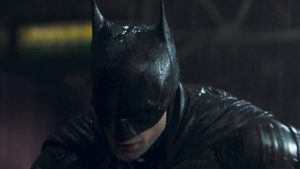
BTL: You might not be able to answer my last question because you haven’t started working on it yet, but while Jurassic World is something you’ve been doing already, The Batman must be tough because there’s so much iconic music associated with the character. People know or think they know what a Batman movie might sound like from Danny Elfman and Hans Zimmer and even the ‘60s show. How do you go into something like that without worrying about repeating what’s been done before or drifting too far from what’s expected.
Giacchino: You know, it’s interesting, because there’s two camps in this thing. There are the people that are like, “Oh, there’s a Batman movie. You better use the Danny Elfman theme or the Hans Zimmer theme,” or who knows what theme. It could be anything, and they refuse to let go of what was. What I love about comic books growing up is that you would see all different versions of Batman. There would be this series, and then there would be a totally different series where he’s almost a different person in a way. You would get everyone’s interpretation of what they thought Batman was, we do it with Shakespeare all the time. Everyone puts on their own version of Shakespeare. In terms of taking an existing character and reinventing it in some way, that’s the great gift of all of this is we get to see different versions of it. For me, it’s more about what is right for our Batman? What are we doing for our Batman? This is our Batman. I’m not concerned about anything that came before. I’m not thinking about that at all. I loved all of it. I was certainly there in the theaters watching it, and I loved Batman since I was a kid, but I’m excited to do our version of it, and what we think it should be. That’s how I approach every time I do one of these movies that is tied to something from the past. It’s about the excitement of “Alright, this is our version, so now we get a chance to do what we think would be cool to do with this character.” So that’s always the approach I take.
Michael Giacchino’s new record, Michael Giacchino & His Nouvelle Modernica Orchestra – Travelogue Volume 1, is available through Mondo on Friday, October 30. He will indeed be talking more about the record on Tim’s Twitter Listening Party on Friday, November 13 at 3pm Eastern, noon Pacific.





